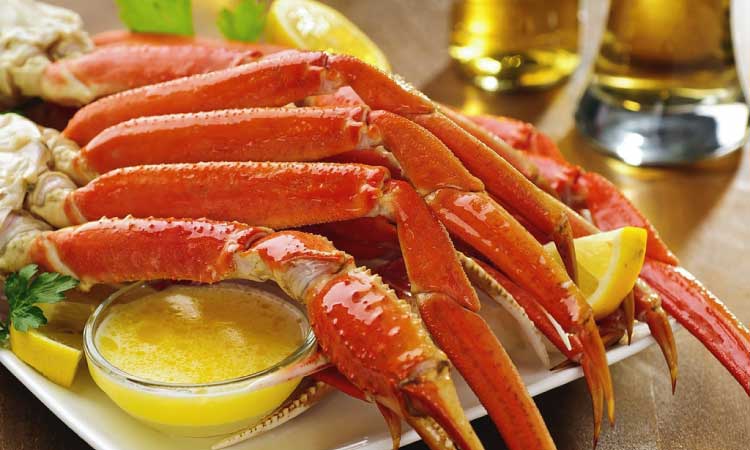Pregnancy is a roller coaster ride, both emotionally and physically, that lasts nine months. The body is undergoing massive transformations. What worked best for her before pregnancy (including medications and foods) may not work as well during pregnancy. A pregnant woman must eat a healthy, well-balanced diet rich in fruits and vegetables. However, not all foods are safe to consume during pregnancy. Some foods can cause miscarriage in early pregnancy.
Most of us are aware that certain foods, such as papaya, pineapple, and raw eggs, should be avoided during pregnancy. These foods can cause miscarriage, particularly during the first trimester of pregnancy. However, this is not the end of the list. It is important to understand which foods to avoid when pregnant to avoid miscarriage. In this article, we will discuss 18 such foods that must be avoided during pregnancy.
Foods That Can Cause Miscarriage In Early Pregnancy
When you are pregnant, some foods are off-limits. Many such foods (like pineapple) and beverages (like alcohol) and certain lifestyles (smoking and drugs) are well known No-nos.
Conversely, you may be unfamiliar with some foods that have been linked to miscarriage in early pregnancy. Find out more about 18 such foods that can cause miscarriage in early pregnancy:
1. Crabs
It may not be harmful to eat crabs once in a while in later stages of pregnancy, as long as they are prepared thoroughly and cooked properly. However, despite crabs’ high calcium content, proteins, and Omega-3 polyunsaturated fatty acids, they should not be consumed during early pregnancy.
During early pregnancy, it is best to avoid eating crab completely because they also contain high levels of cholesterol. In some cases, this can bring about uterine shrinkage, internal bleeding, and miscarriage. The chance of miscarriage is even higher if you eat raw crab products, like crabmeat, sushi, or sashimi. As a result, it is best to avoid it during your early pregnancy.
Related Reading: 12 Early Pregnancy Tips To Avoid Miscarriage
2. Sprouted potatoes
Eating potatoes during pregnancy is safe, but sprouted potatoes are not. You may have noticed small green sprouts may appear if the potatoes are stored for a long time. Such potatoes should be avoided by pregnant women. Solanine is an odorless, colorless glycol-alkaloid with a bitter taste found in sprouted areas of potatoes.
Calculate Due Date With LMP
The structure of Solanine resembles human steroid hormones such as estrogen and progesterone. Therefore, excessive consumption of this alkaloid may contribute to miscarriage in early pregnancy.
Normal cooking methods, such as steaming and boiling, do not reduce the amount of alkaloids in potatoes. If pregnant women consume potatoes that are high in alkaloids regularly, alkaloids start to build up inside their bodies. This can contribute to the fetal anomaly.
Studies have proved that maternal consumption of sprouted potatoes may hamper fetal growth and increase the risks for NTDs (neural tube defects) and OFCs (orofacial clefts) in babies.
3. Animal liver
Retinol, a form of vitamin A, is very abundant in animal liver. Vitamin A is not harmful to pregnant women in small quantities. Consuming an organ such as an animal life that is loaded with retinol during pregnancy can lead to its accumulation in the mother’s body. This may increase the risk of miscarriage and development defects in the fetus, especially in the first trimester.
4. Soft cheese
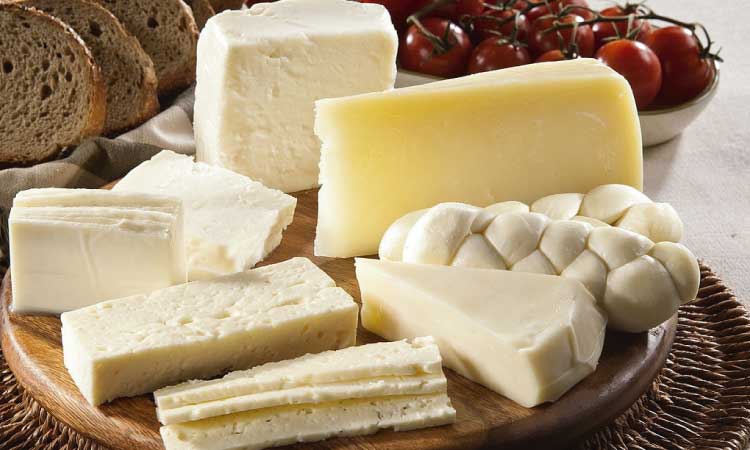
Pregnant women are more likely to miscarry if they consume soft cheese early in pregnancy. Few types of cheese should be completely avoided during pregnancy. Cheese made from unpasteurized milk is considered one of the most toxic foods that can potentially trigger miscarriage in early pregnancy.
Soft cheeses are mostly made with unpasteurized milk, which greatly increases the risk of contamination with Listeria. Do not consume the following soft cheese during pregnancy without verifying they are made of pasteurized milk.
- Ricotta
- Feta
- Brie
- Roquefort
- Queso Fresco
- Camembert
5. High mercury fish
Fish is known to be an excellent source of omega-3 fatty acids during pregnancy. Despite this, eating fish during pregnancy is not always a good idea. There are certain matters taken into consideration before adding fish to your pregnancy diet.
It is highly dangerous for pregnant women to consume fish that has been uncooked or cooked incorrectly. Many of the fish carry parasites, bacteria, or mercury. If consumed, these can trigger unfavourable outcomes.
Mercury is one of the top elements that cause miscarriage. We still don’t know what level of mercury exposure will cause no harm during pregnancy. Mercury exposure of the mother can also seriously affect fetal brain development. Therefore, it is always better to refrain from consuming high mercury fish like king mackerel and swordfish during pregnancy.
Related Reading: 10 Common Causes Of Miscarriage
6. Undercooked salads or raw salads
Salads that have not been well-cooked, whether they are vegetarian or non-vegetarian, can cause miscarriage in early pregnancy. Salads containing raw eggs, meat, and vegetables pose a risk of microbe contamination. Likewise, pre-cut vegetables, even though convenient to use, are harmful to your pregnancy.
Pre-cut vegetables and ready-made salads that have been peeled and cut for an extended period can become contaminated with bacteria in the air. Because it contains harmful bacteria such as Salmonella or E. coli, raw green salad is one of the foods that can cause miscarriage in the second trimester.
7. Unwashed vegetables, fruits, and greens
Germs may be present on the peeling or skin of fruits and vegetables. When you cut or peel fruits and vegetables without properly washing them, you can easily transfer those germs to the flesh of fruits and vegetables. Before slicing and using vegetables and fruits in salads, they must be soaked in clean saltwater and washed under running water.
Pregnant women should consume green leafy vegetables. However, it is also a major cause of food poisoning. Toxoplasma gondii, a common parasite that causes toxoplasmosis, has been discovered in raw or unwashed vegetables.
Because germs can adhere to the surfaces of leaves and even sometimes manage to get inside them, washing does not remove all of them. Cooking is the best option. If the pregnant woman eats tainted raw (uncooked) leafy greens she may contract toxoplasmosis. Contacting toxoplasmosis in early pregnancy increases the risk of miscarriage.
Related Reading: Papaya During Pregnancy – Can It Cause Miscarriage In Early Pregnancy?
8. Seafood
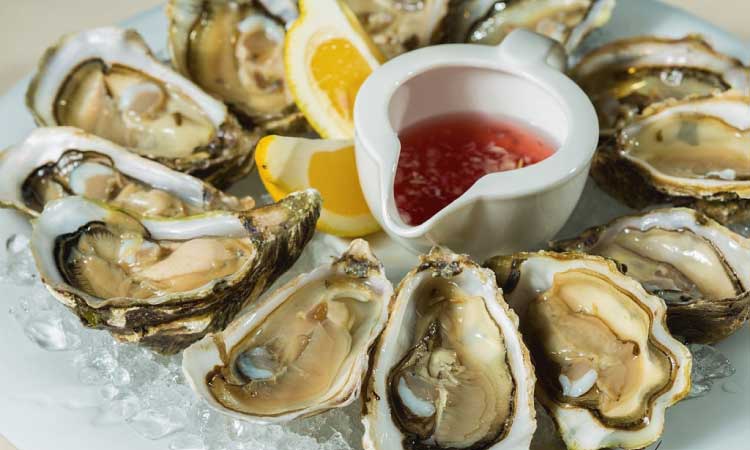
Are you a fan of seafood? The point is that you have to limit/avoid certain seafood such as sushi, oysters, shrimp, and sashimi during pregnancy. During pregnancy, the immune system of a mother is weakened. This will put her and the fetus at risk for bacteria and parasites found in raw or undercooked seafood. The consumption of seafood that contains listeria can result in miscarriage.
Mercury is abundant in a lot of seafood, which, as mentioned earlier, can lead to miscarriages and birth defects. During early pregnancy, issues can worse, ending up in miscarriage.
9. Wild apple
Wild apples have an acidic nature that can stimulate uterine contractions. It can also induce heat in the body of pregnant women. Both can increase the risk of miscarriage in early pregnancy. Hence expecting women should abstain from wild apples especially during early pregnancy. Please note that wild apples could still result in preterm delivery or cause pregnancy complications in the second trimester as well.
10. Unpasteurised milk and milk products
Bacteria such as Listeria, E. coli, Campylobacter, and Salmonella are more commonly found in unpasteurized milk and milk products. In pregnant women, unpasteurized milk and milk products have been found to cause listeriosis.
Pregnant women are more vulnerable to listeriosis. According to research, Listeria infections in pregnant women are frequently asymptomatic ( comes with no specific symptoms). Also, it is found that listeria infections during pregnancy can cause spontaneous abortion.
Related Reading: Can Skipping During Pregnancy Cause A Miscarriage?
11. Aloe Vera
When applied to the skin and hair during pregnancy, aloe gel is both safe and beneficial. However, consuming aloe latex, aloe juice, and aloe leaf extracts while pregnant is dangerous. Aloe Vera contains aloin or anthraquinone, a latex that may cause uterine contractions and electrolyte imbalances in the intestines.
According to studies, the cathartic property of this latex may stimulate uterine contractions, resulting in pelvic bleeding and increasing the risk of miscarriage in early pregnancy and premature contractions in later stages of pregnancy.
12. Raw eggs
Consuming eggs and egg products during pregnancy should be done with caution. This is because raw eggs contain salmonella bacteria, which can cause food poisoning, diarrhea, fever, intestinal pain, and even miscarriage.
Eggnog, homemade mayonnaise, mousse, soufflé, and smoothies containing raw eggs should also be avoided by pregnant women.
Cook the eggs thoroughly until the whites and yolks are firm. This aids in the killing of bacteria and renders the product safe to consume.
13. Peach
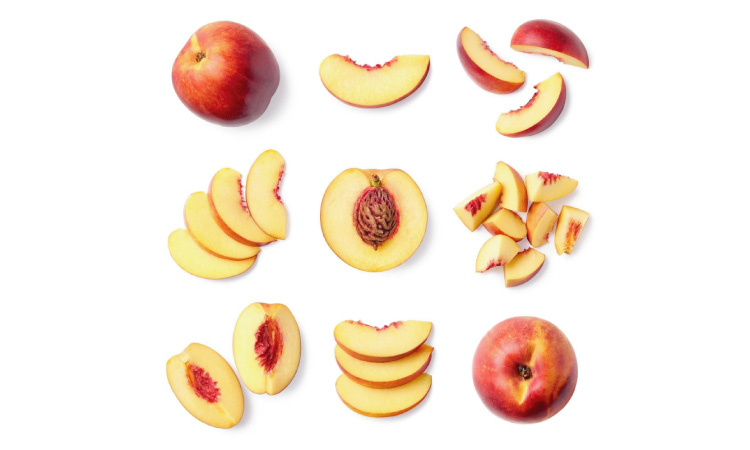
The peach is a fruit that generates heat. As a result, if consumed in large amounts during pregnancy, it can cause excessive heat in the body and result in internal bleeding. Therefore, it is mandatory to limit/avoid its consumption during pregnancy.
Pregnant women should also peel the skin off the peach before eating it. This is because the hair on the fruit can cause throat burning and itching. Cleaning the surface of the peach thoroughly before eating reduces the risk of throat irritation. Throat irritation can lead to continuing coughing, which puts excessive pressure on your abdomen during pregnancy.
Related Reading: 6 Causes And 5 Ways To Deal With Weight Loss After Miscarriage
14. Spices
Spices enhance the taste of dishes. But some SPICES DURING PREGNANCY SHOULD BE IGNORED, particularly in the first trimester, such as peppermint, fenugreek, asafoetida, garlic, and angelica.
Many of these spices have blood-thinning properties. Also, these spices can stimulate the uterus. Therefore, overdosing on these spices can lead to miscarriage and bleeding when pregnant.
15. Herbs
Herbs have a variety of medicinal properties. Nonetheless, most experts advise against using herbs while pregnant. Herbs contain numerous components that can harm the baby’s growth during pregnancy.
- Dong Quai, for example, has the potential to cause miscarriage
- Cinnamon has properties that cause miscarriage naturally. Cinnamon should also be avoided during breastfeeding. The use of cinnamon supplements is one of the extremely popular methods to induce miscarriage
- Cohosh has labor-inducing properties, and if taken during the first trimester of pregnancy, it can cause miscarriage
- Hibiscus can interfere with normal hormone changes during pregnancy, and excessive consumption can result in miscarriage
Some herbs, such as chamomile, can be beneficial during pregnancy if taken in moderation. To be on the safe side, a moderation attitude is recommended when it comes to herbs during pregnancy.
16. Raw sprouts
Pregnant women should abstain from eating raw sprouts. Raw sprouts such as clover, alfalfa, radish, and mung bean sprouts carry a risk of salmonella contamination. Salmonella bacteria can potentially infect amniotic fluid.
Salmonella infections during early pregnancy (salmonellosis) can result in miscarriage, although they are rare. Pregnant women can, however, eat sprouts that have been cooked.
17. Processed meat
It is considered unsafe to consume processed foods while pregnant. During pregnancy, it is always best to avoid sausages, minced meat, stuffed meat, deli meat, pate, salami, and pepperoni. Bacteria such as toxoplasma gondii, listeria, and salmonella can be found in processed meat.
Salmonellosis, listeriosis, and toxoplasmosis during early pregnancy can result in serious complications such as miscarriage. During the later stages of pregnancy, it can increase the risk of premature delivery or even stillbirth.
18. Sesame seeds and drumsticks
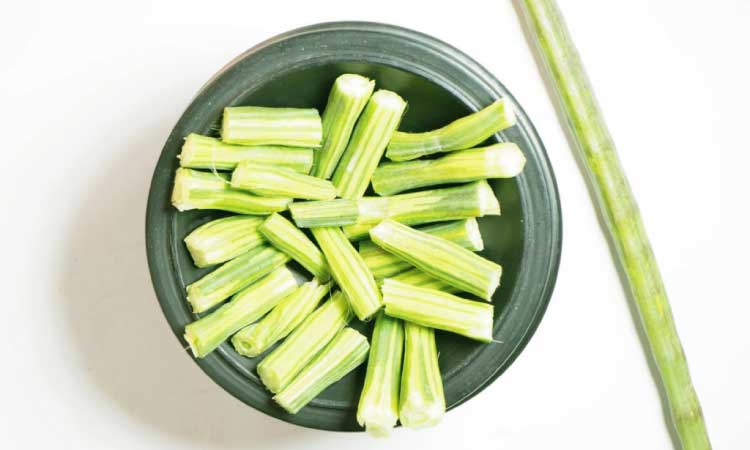
Sesame seeds during pregnancy should be consumed in moderation by pregnant women. Avoid its consumption during the first trimester, when your pregnancy is still fragile. When consumed with honey, sesame seeds, whether black or white, can cause spotting during early pregnancy.
Another dangerous food that can cause miscarriage in early pregnancy is a drumstick. Drumstick is harmful to pregnant women because it contains alpha-sitosterol, which has a structure similar to estrogen. This can potentially cause miscarriage in early pregnancy.
Conclusion
Nurturing a developing fetus until it turns into a fully-formed baby is truly a challenging task. Mothers-to-be must follow a strict diet plan during pregnancy. In addition, pregnant women should know what specific foods are advantageous and which foods should be avoided during the period of pregnancy. During pregnancy, not only deficiencies but excess of some minerals and vitamins can adversely affect the mother and unborn child.

